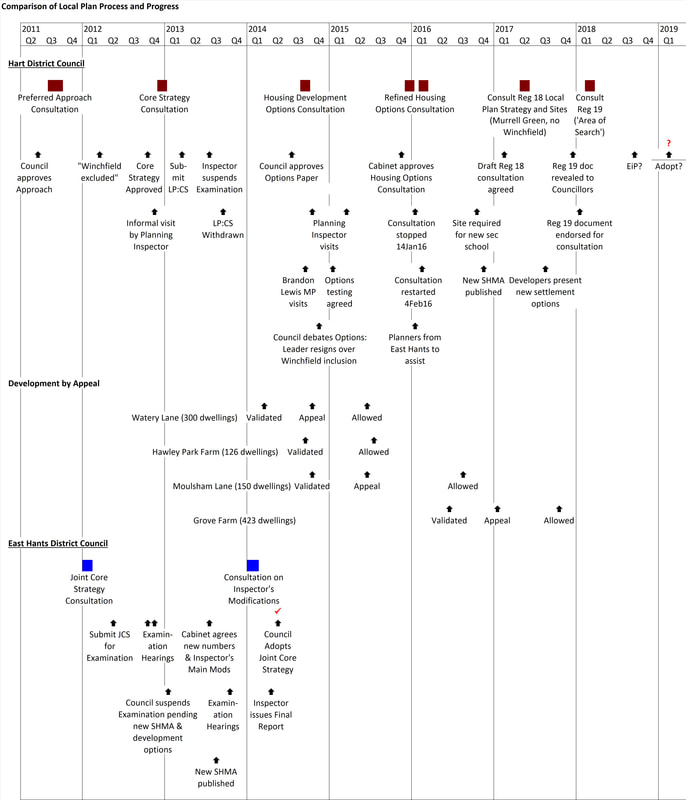Hart Observers - Local Plan Time Line
Christopher Riley has been attending the meetings of the full Hart Council and the Council Cabinet for the last six years and providing synopses and commentaries on the debates and activities to the Hart Observers. Recently he has written to the Hart Observers explaining why he cannot support the Conservatives' campaign to regain control of Hart Council. |
He cites two reasons:
· The risk of further delay to the adoption of Hart's Local Plan; · As the previous Administration, the Conservatives showed no drive to get the Local Plan in place, in contrast to East Hampshire, another Conservative-controlled Council, whose Local Plan was adopted on 8 May 2014. He has produced a chart (see below), that contrasts the Hart and East Hampshire processes and timings. The chart also includes the Planning Appeals for the major sites within Hart that might have been avoided with an adopted plan. Christopher observes that, whatever the outcome in May, it is essential the Hart continues with the Examination in Public of the Local Plan and adopts it as soon as possible. This is because: · Without a Local Plan in place, Hart still is vulnerable to planning applications from developers on sites that we do not wish to be developed, for example, Elvetham Chase, West of Hook and Cross Farm in Crookham Village; · There is a real danger that the Department of Communities and Local Government will take over Hart’s Local Plan process and dictate to Hart how many, what and where. You will be aware that in November the Local Government Minister, Sajid Javid, identified 15 councils where the Government will intervene due to failures to meet planning deadlines: at the time, there was some relief that Hart was not one of those identified. Christopher has highlighted that one of the areas of contention is the inclusion in the current Regulation 19 document as Policy SS3 of an ‘area of search’ for a new settlement around Murrell Green and Winchfield. Despite 9 Conservative Councillors voting on 4 January to endorse the Regulation 19 document, there are rumours circulating that influential voices within the Conservatives would like to withdraw the Regulation 19 document and remove Policy SS3, presumably before re-submitting. Already in the run-up to the Election, the need for Policy SS3 is being challenged strongly by some of the Conservative Councillors who voted previously to endorse the Regulation 19 document, so these rumours are plausible. If Policy SS3 is removed, will the Planning Inspector who conducts the Examination in Public consider Hart’s Plan ‘sound’ if there is no provision for future housing?
|
In conclusion; the Conservatives have really let us down on the Local Plan. |
Christopher points out that the Conservatives’ management of Hart’s Local Plan process is hardly a demonstration of professionalism or competence. One can speculate on the reasons for the continual delays, but the result has been Development by Appeal, or Urban Extensions by Stealth. In turn, the contentious need to develop around Winchfield was avoided continually. He observes that he does not think that there has been a Damascene conversion to the need for urgency. He does not want to risk any further delay that could arise, either from lack of endeavour, or because of withdrawal of the Regulation 19 document for amendment to remove Policy SS3 on the new settlement.
|

